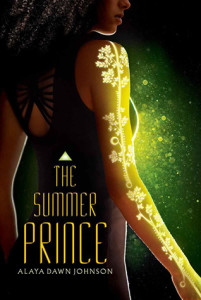
The Summer Prince is the best book I’ve ever read.
I don’t say that lightly. It’s not an exaggeration. I’ve read it twice in the space of two months, first in March, and now in May, and in all the time between those dates, I never stopped thinking about it.
The first time, it took my breath away. I didn’t want to review it then: some experiences are so pure, so perfect, that you can’t bear to sully them with analysis – not right away, at least. I had to savour it for a while; I had to let it sit. But even so, I always knew I’d come back to it. Not just because it’s beautiful, and not just because it’s brilliant, but because I’d be betraying myself if I didn’t do everything in my power to convince other people to read it. There need to be more books like this (there can’t be another book like this), and by now, I can almost hear you thinking, she’s overhyped it, nothing can live up to this sort of press and now I’ll be disappointed – but hear me out. Listen: I can’t guarantee The Summer Prince will touch you the way it did me. I’d be lying if I tried to promise anything of the sort. But every new book is a gambit, wagering your taste against a cover’s tricks, a blurb’s allure, the measure of praise or condemnation with which you’ve heard it hawked. I can’t promise that you’ll fall in love, like I did.
Nonetheless. If you’re going to risk your money and heart on only one new book this year, make it this one.
Palmares Três isn’t some failed utopia, nor is it actively dystopian: instead, it’s a city in flux.
Four hundred years ago, the world was decimated by disaster – nuclear wars; the Y Plague, which wiped out 70% of the male population; hunger and holocaust and disease – and so Palmares Três was founded: not the last bastion of civilisation by any extent, but a city run by women, because it was men who ruined the world. Ordinarily, that’s the sort of plot point you’d see either trotted out by benevolent sexists or put in the mouths of straw feminists, but through an exquisite balance of skill and subtlety, Johnson makes it work. Palmares Três isn’t some failed utopia, nor is it actively dystopian: instead, it’s a city in flux, where wakas (those under thirty) and grandes (anyone older) are skirmishing over how to shape the future – and thanks to the widespread use of life-extension techniques, the grandes are old indeed. But at the heart of both Palmares Três and the unrest between her citizens is the summer king ritual. Every four years, a king is elected to rule from summer to winter, and afterwards, his throat is slit as he picks the next queen – his choice is deemed incorruptible, because a dead man can’t be swayed beyond his principles.

“I imagine I’m a Queen. Odete, sitting in a bomb shelter somewhere on the coast of Bahia, in a country that had once been Brazil, and trying to force a new world from the screaming mouth of the old one. What wouldn’t I do? What wouldn’t I create? Who wouldn’t I sacrifice, if it would keep the world from ever dying again?
“So I take my lover, my king, and I put him on a pedestal and I cut him down. A man, like the ones who ruined the world.
“I take from the world I know: Candomblé, which always respected a woman’s power; Catholicism, which always understood the transformation of sacrifice. And Palmares, that legendary self-made city the slaves carved themselves in the jungle, proof that a better world can be built from a bad one…
“When the world is destroyed, someone must remake the world. I think, you’d call that art.” (pg. 19)
A deceptively effortless examination of politics, power, kinship, art, ambition, death and love.
June Costa is an artist – the best in Palmares Três, she boasts – who lives to plot secret art projects with her best friend, Gil. Enki is the summer king: beautiful, bright and conspicuously black, his immigrant mother having reached Palmares Três too late in her pregnancy for his genes to be tweaked into a more fashionable alignment. Caught up in the thrill of the summer king election, June and Gil are both a little in love with Enki, as are most of the wakas of Palmares Três – and when they manage to catch his eye with one of June’s anonymous art projects, it seems like the highlight of their year. But when they meet the summer king in person, two things happen: Enki and Gil fall instantly, publicly in love, while Enki and June start creating radical, political art that impacts the whole city. Because Enki is from the verde – the literal bottom tier of Palmares Três – and try though they might, the ruling Aunties can’t ignore the voices of those they’d rather keep silent; not with the summer king speaking for them. How much change can Enki effect before his death? What is the real cost of power – and what the price of integrity when confronting it?
With its sharp writing, magnetic characters, pitch-perfect setting and vivid plot, The Summer Prince is a deceptively effortless examination of politics, power, kinship, art, ambition, death and love. Johnston writes with a fluid, electric poetry that manages to be neither purple nor melodramatic, imbuing the story with graceful descriptions and lines that can pierce your heart.
“To love light, you have to love dark. I’m not trying to be profound, I know you’ll understand. I don’t mean that you have to hate to love, or that you have to die to live.
“I mean that sometimes, you turn out the lights just to turn them back on.” (pg. 98)
 Told primarily from June’s immediate first-person perspective, but interspersed with occasional thoughts from Enki, The Summer Prince – which is technically YA, but which transcends the idea of a fixed readership as skilfully as it navigates difficult themes – stands as a subversively compelling usage of a narrative voice which is all too easily (and, alas, all too often) given over to a combination of samey, solipsistic snark and selfish whining. June is a brutally real character, and one whose growth is evident throughout the course of the novel. Though privileged and ambitious, she’s also allowed to be sensual, hot-tempered and angry, a combination that’s seldom if ever portrayed as a positive one for female characters, and less often still for women of colour. June’s anger in particular defines her early characterisation: after her father’s suicide (or kiri) at the age of a hundred and forty, June is angry at everyone – at her mother for remarrying soon after his death; at her stepmother, Auntie Yaha, for trying to take his place; at her academic rival, Bebel, for displaying exactly the calm, fair-minded passion that June knows herself to lack; at everyone in Palmares Três who tries to ignore both Enki and the verde. But though it walls her off from her family in particular, there’s a powerful strength and clarity to June’s anger, so that instead of railing helplessly, she channels it into making art – and in so doing, transforms both herself and others.
Told primarily from June’s immediate first-person perspective, but interspersed with occasional thoughts from Enki, The Summer Prince – which is technically YA, but which transcends the idea of a fixed readership as skilfully as it navigates difficult themes – stands as a subversively compelling usage of a narrative voice which is all too easily (and, alas, all too often) given over to a combination of samey, solipsistic snark and selfish whining. June is a brutally real character, and one whose growth is evident throughout the course of the novel. Though privileged and ambitious, she’s also allowed to be sensual, hot-tempered and angry, a combination that’s seldom if ever portrayed as a positive one for female characters, and less often still for women of colour. June’s anger in particular defines her early characterisation: after her father’s suicide (or kiri) at the age of a hundred and forty, June is angry at everyone – at her mother for remarrying soon after his death; at her stepmother, Auntie Yaha, for trying to take his place; at her academic rival, Bebel, for displaying exactly the calm, fair-minded passion that June knows herself to lack; at everyone in Palmares Três who tries to ignore both Enki and the verde. But though it walls her off from her family in particular, there’s a powerful strength and clarity to June’s anger, so that instead of railing helplessly, she channels it into making art – and in so doing, transforms both herself and others.
And then there’s Enki: remarkable, brilliant Enki, who “walks so close to the edge of acceptable behaviour that his feet bleed” (pg 16). Even before he’s elected summer king, he’s already subverting and exploiting the role to his own ends, not only by championing the verde, but by reminding Palmares Três of its origins and the uncomfortable prejudices underlying its social code. In Enki’s hands, the position of summer king is the ultimate piece of performance art, and it’s June’s recognition of this fact which unites them as collaborators. Yet his ambitions also run deeper: being the summer king allows him access to technology and body mods that the Aunties otherwise restrict, but which Enki uses to forge a unique connection with Palmares Três itself. His name is therefore a very deliberate choice on Johnson’s part: Enki was an ancient Mesopotamian god, both a trickster and a prominent city’s patron, and given the novel’s musings on the relationship between royalty and divinity, that connection is more than superficially meaningful.
“He said that summer kings were above morality, and he was right, and he was wrong.
“Gods are what people worship. Men are what die…
“The summer kings are gods, and we are finally, in the end, just men.” (pg. 145)
Often in novels featuring unusual (which is to say, non-monogamous, non-heteronormative, non-patriarchal) social structures, there’s an understandable temptation for authors to engage in philosophic asides regarding how and why these societies work. Depending on the context, this can take the form of anything from tiring and overtly didactic infodumps to subtle and engaging social commentary; but what it often isn’t, is absent entirely. Though The Summer Prince wears some discussions proudly (and effectively) on its sleeve, one aspect of the storytelling that goes totally unanalysed is the question of sexuality. Without once mentioning sexual orientation or offering any justification as to why this should be so, Johnson has succeeded in writing a book where both gay and open relationships are both normative and visible within the story. Having lost her husband, June’s mother remarries a woman; June and Gil lose their virginity together, but both are in love with Enki, who in turn loves both of them, and none of it is ever once remarked upon. It’s a glorious portrayal of sexual autonomy and diversity on all counts, and one which also fits perfectly within the wider story.

Art by Naughty Dog
Throughout the novel, there’s a powerful discussion of mortality, death and the balance between power and integrity. At various points, both June and Enki compromise themselves in order to gain a necessary advantage, but each one is acutely aware of the moral cost of their actions. The point of the summer king’s ritual death – to sanctify his choice of queen as inviolate and incorruptible – is juxtaposed against not only June’s father’s suicide, but her own gradual struggle to do the right thing, even if it means risking her future. Enki chooses to be summer king precisely because it allows him the freedom to act as he otherwise wouldn’t or couldn’t: having already accepted death, his actions have no repercussions. June, however, has to wrestle with the very real cost their rebellion poses to her future: should she work outside the system and risk being exiled, or work within and risk being consumed?
To her credit, Johnson never sugarcoats this dilemma, allowing us to see June’s doubt and selfishness as well as her strength. “I’ll win the Queen’s Award,” June tells herself, “I’ll become a famous artist, and then I’ll do good – when I have a position and influence and a life to do it with. If I make this one futile gesture, then what? I never get to see my home again?” (pg. 211) But given that she occupies a privileged position within Palmares Três – her stepmother is an Auntie, after all – there’s also the sense in which, despite her subversive art projects, June has never really been risking herself; unlike Enki, who has always been risking everything.
“I was just playing at being radical, trying on transgression like my skin lights, secure that I could cut it out and go right back to graduating and university just as soon as the year was over.
“Just as soon as Enki died.” (pg. 136-137)
The Summer Prince is the best book I’ve ever read.
There’s so much more I could say about this book – about the beauty of the language; about the graceful economy with which the pacing and detailing are managed, so that we both learn the world and move through it at exactly the right speed; about the romance between Enki and June, which is fierce and real and complicated, and more all the more convincing for not being needlessly foregrounded; about the perfectly executed denouement – but in the end, it’s simpler to just let the story speak for itself. The Summer Prince is the best book I’ve ever read, and one which whose language, themes and characters will continue to speak to me for the rest of my life.


That is some serious praise. I’m pushing this one to the top of my TO READ pile. Thanks Foz! Great review!
[…] Foz Meadows (aidanmoher.com) […]